Related: North Carolina’s Witch Hunt Over Critical Race Theory. By Justin Parmenter / The Progressive
Related: Schools become political ‘battlefield’ in culture wars Trump cultivated. By Allan Smith / NBC News
Related: Fake news: Sinclair spreads lies about race education in schools. By Laura Clawson / Daily Kos
Political / Social
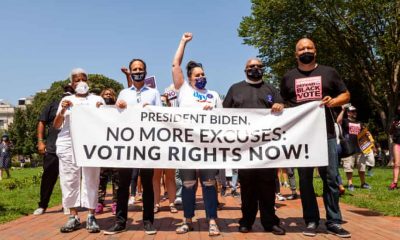 Biden vowed to make racial justice the heart of his agenda – is it still beating? By Lauren Gambino / The Guardian
Biden vowed to make racial justice the heart of his agenda – is it still beating? By Lauren Gambino / The Guardian
Since taking office, Biden has placed racial justice at the center of his governing agenda, embedding language that promotes equity into his executive orders, policy proposals and public speeches. “The dream of justice for all will be deferred no longer,” he vowed in his inauguration address. “We can deliver racial justice.” Yet the escalating fight over voting rights underscores the difficulty Biden faces in his efforts to advance racial equity. It is an issue that is critical to his legacy but one that faces a myriad of political and legal obstacles. Read more
Related: The John Lewis Act would restore key voting protections. Democrats should fight for it. By the Editorial Board / Wash Post
Related: New Texas voting bill deepens growing disparities in how Americans can cast their ballots. By Elise Viebeck / Wash Post
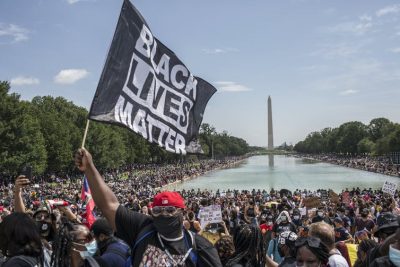 Black Lives Matter: How far has the movement come? By Kwasi Konadu and Bright Gyamfi / The Conversation
Black Lives Matter: How far has the movement come? By Kwasi Konadu and Bright Gyamfi / The Conversation
Black Lives Matter started in 2013 as a messaging campaign. In response to the 2012 acquittal of George Zimmerman for shooting and killing Black teenager Trayvon Martin, three activists – Opal Tometi, Alicia Garza and Patrisse Cullors – protested the verdict on social media, along with many others. Cullors came up with the hashtag #BlackLivesMatter, which gained widespread use on social media and in street protests.
Over the next several years – as Black Lives Matter flags, hashtags and signs became common features of local, national and even international protests in support of Black lives – this messaging campaign became a decentralized social movement to demand accountability for police killings and other brutality against Black people. Read more
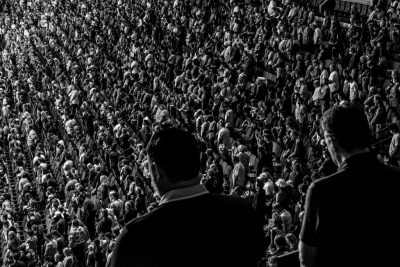 From ‘Ku Kluxism’ to Trumpism. By Charles M. Blow / NYT
From ‘Ku Kluxism’ to Trumpism. By Charles M. Blow / NYT
One hundred years ago this week, The New York World began to publish a 21-part explosive exposé on the inner workings of the Ku Klux Klan. It was a sensation. At least 18 other newspapers across the country ran The World’s bombshell reporting. According to The Columbia Journalism Review, “The series drew two million readers nationwide. New Yorkers stood in line for copies. And the Justice Department and several congressmen promised to investigate the group.” The World would win a Pulitzer Prize for its efforts. Read more
 The South’s Republicans Talk About Freedom While People Die. By Margaret Renkl / NYT
The South’s Republicans Talk About Freedom While People Die. By Margaret Renkl / NYT
Freedom from what? is the real question. Freedom from death is surely at the top of anybody’s priority list. (Please disregard Tate Reeves, governor of Mississippi, who believes Southern Christians aren’t all that worried about death.) Nevertheless, Rand Paul, the senator from Kentucky, is more interested in investigating the Covid-treatment benefits of a horse dewormer — despite warnings about its dangers from the Food and Drug Administration, the Centers for Disease Control and Prevention and the American Medical Association — than in getting his constituents vaccinated. Read more
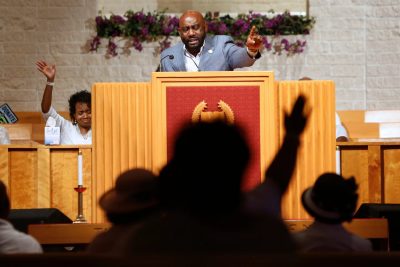 Why America needs the Black church for its own survival. By Charlie Dates / Wash Post
Why America needs the Black church for its own survival. By Charlie Dates / Wash Post
America finds itself at another reckoning moment. There are multiple pandemics at play. Census data suggests that the old ethnic majority is diminishing in number. A Capitol insurrection reveals a hyper-vigilance to maintain the old power structures. Yet with a steady beat, the Black church proclaims a brighter day. Breonna Taylor, Ahmaud Arbery, Laquan McDonald and others whose names are rarely mentioned in national news require a more robust theology. Their lives plead for answers to the problem of evil. The young and restless marching in our streets are looking for an answer to hopelessness. No other ethnicity forged on American soil has a testimony that expresses an unyielding confidence in the God of our weary years like the Black church. Read more
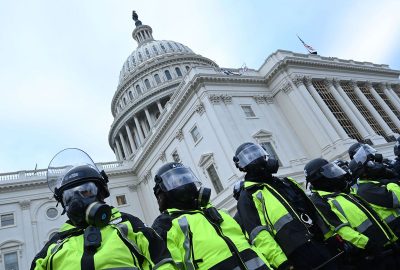 Black cop shoots white woman: The saga of Michael Byrd and Ashli Babbitt. By Chauncey Devega / Salon
Black cop shoots white woman: The saga of Michael Byrd and Ashli Babbitt. By Chauncey Devega / Salon
The officer who shot Ashli Babbitt, Lt. Michael Byrd, has now come forward and identified himself, although at first his name was not disclosed because of safety concerns. Babbitt was immediately elevated into a martyr by the right-wing media. In their fictional world, she was the “victim” of overzealous police, who used “excessive force” against an unarmed “patriot.” As a white woman, Babbitt made a particularly compelling figure to the right-wing imagination, defined by her race and gender through the white racial frame as automatically being “innocent” and “vulnerable.” Read more
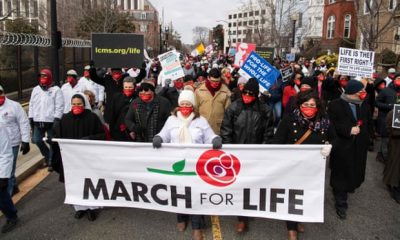 There’s a straight line from US racial segregation to the anti-abortion movement. By Randall Balmer / The Guardian
There’s a straight line from US racial segregation to the anti-abortion movement. By Randall Balmer / The Guardian
The supreme court’s refusal to block Texas’s restrictive new abortion law suggests that the end to country-wide legal abortion might be at hand. For white evangelicals, the rank and file of the anti-abortion movement who have worked tirelessly to overturn the 1973 Roe v Wade decision, this represents the culmination of efforts that date back to – well, about 1980. Although leaders of the religious right would have us believe that the Roe decision was the catalyst for their political mobilization in the 1970s, that claim does not withstand historical scrutiny. What prompted evangelical interest in politics, in fact, was a defense of racial segregation. Read more
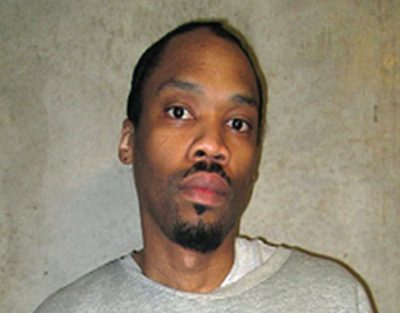 Facing execution, Julius Jones seeks clemency — with help from an unlikely ally. By Kim Bellware / Wash Post
Facing execution, Julius Jones seeks clemency — with help from an unlikely ally. By Kim Bellware / Wash Post
For 22 years, Connie Ellison has sought answers to the questions that sprang from the night her boyfriend was murdered in the driveway of his parents’ home. Her questions lingered even after a man was convicted and sentenced to death row for the crime. They have led her to an unexpected place: advocating for the man, Julius Jones, as his case reaches an urgent new phase. Last week, Oklahoma’s attorney general requested an Oct. 28 execution date for Jones, who was 19 at the time he was arrested for the murder of Paul Howell, Ellison’s boyfriend. Jones, now 41, has spent half his life in prison and maintained his innocence. Read more
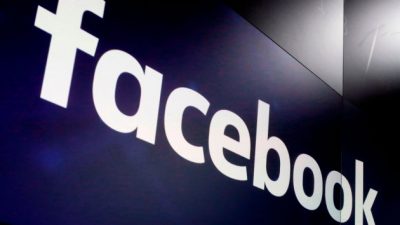 Facebook’s AI Seems to Have a Racism Problem. By Edwin Rios / Mother Jones
Facebook’s AI Seems to Have a Racism Problem. By Edwin Rios / Mother Jones
For more than a year, after Facebook users watched a video showing encounters between Black men and white civilians and cops, they received an automated prompt asking if they wanted to “keep seeing videos about Primates.” On Friday, the social media giant apologized for the decisions its AI apparently made. Read more
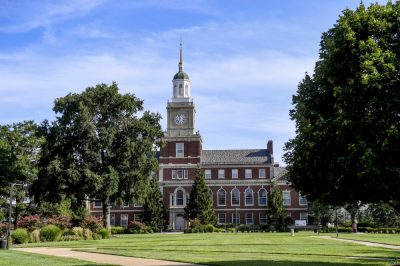 HBCUs grapple with vaccination mandates as students return to campus. By Dartunorro Clark / NBC News
HBCUs grapple with vaccination mandates as students return to campus. By Dartunorro Clark / NBC News
With students at historically Black colleges returning to campus after a year of hybrid and remote learning, administrators hope greater access to Covid-19 vaccinations will bring about a traditional campus experience — in-person classes, rip-roaring homecomings and Black Greek life. But interviews with top leaders from several top historically Black colleges and universities, or HBCUs, illustrate that some schools face significant challenges in avoiding major outbreaks. Although Black Americans have been disproportionately affected by the coronavirus, Black leaders across the country have encountered both vaccination skepticism and accessibility issues trying to encourage higher inoculation rates. Read more
Historical / Cultural
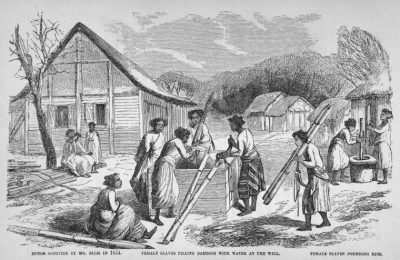 Theorists, Strategists, and Histories of Slavery. By Diana Paton / AAIHS
Theorists, Strategists, and Histories of Slavery. By Diana Paton / AAIHS
In the 1640s in the Dutch colony of New Amsterdam, Maria Portogoys, a “half free,” formerly enslaved woman, arranged that her daughter be apprenticed as a household servant. Jennifer L. Morgan interprets this act as a strategic effort to break the matrilineality inherited commodification inherent in Atlantic racial slavery. Morgan’s wide-ranging Reckoning with Slavery: Gender, Kinship and Capitalism in the Early Black Atlantic has women like Maria Portogoys at its heart. This “interdisciplinary examination of ideas” (23) asks readers to reorient our understanding of enslaved African and African-descended women, thinking of them as intellectual agents, as theorists and strategists, rather than primarily as people to whom history happened. Read more
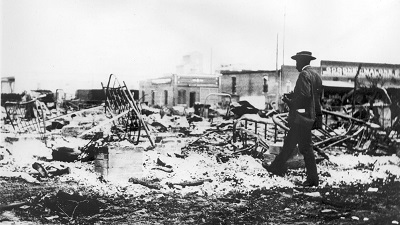 Shattering the Hollywood Myths of the Tulsa Race Massacre. By Tirhakah Love / Daily Beast
Shattering the Hollywood Myths of the Tulsa Race Massacre. By Tirhakah Love / Daily Beast
The work of recognizing those affected by the massacre has largely been carried out by well-known white-run studios, which begs inquiry into their intention, meanings, and messaging. Over its two hour-long episodes, Tulsa Burning: The 1921 Race Massacre, directed by the prolific Stanley Nelson and executive produced by NBA superstar Russell Westbrook, provides a multidirectional lens on the tragedy and residual harm that the attack on Black life had on its citizens; while historians like Hannibal B. Johnson, who’s work on what he terms “Black Main Street” in Tulsa Burning, gave life to the idea that these 35 blocks encompassed some of the more innovative and distinguished Black businesses in the country. Read more
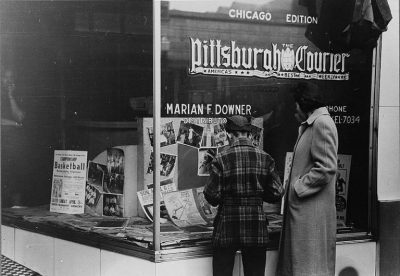 The Pittsburgh Courier’s Discursive Power, 1910-1940. By Adam Lee Cilli / AAIHS
The Pittsburgh Courier’s Discursive Power, 1910-1940. By Adam Lee Cilli / AAIHS
“A Negro seaman whose ship was then in Boston Harbor was the first martyr in the cause of American independence,” wrote Joel A. Rogers in the May 16, 1936 issue of the Pittsburgh Courier. By then, Rogers’s historical vignettes had appeared so often in the Courier that they seemed commonplace, yet they reveal much about the paper’s greater mission to reshape American racial discourse. From the Progressive Era through the interwar years, the Courier stood as a bulwark against the anti-Black rhetorics that had pervaded mass culture. It bolstered African Americans’ sense of self-worth each week by publishing positive accounts of Black life and by celebrating major achievements of Black historical figures. It marshalled powerful arguments against white supremacist racial theories and contested demeaning portrayals of African Americans in the press and popular culture. And it raised consciousness among African Americans about the major issues they faced. Read more
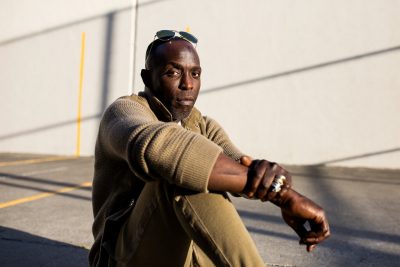 Michael K. Williams, Omar From ‘The Wire,’ Is Dead at 54. By Julia Jacobs, Annie Correal, Matthew Haag and Jeremy Egner / NYT
Michael K. Williams, Omar From ‘The Wire,’ Is Dead at 54. By Julia Jacobs, Annie Correal, Matthew Haag and Jeremy Egner / NYT
Michael K. Williams, the actor who brought a hard-edge charisma to his portrayal of Omar Little, the sawed-off-shotgun-wielding stickup man on the pioneering HBO series “The Wire,” was found dead on Monday in his home in the Williamsburg neighborhood of Brooklyn. He was 54. His longtime representative, Marianna Shafran, confirmed the death in a statement and said the family was grappling with “deep sorrow” at “this insurmountable loss.” Read more
Related: Michael K. Williams Wrestled With Being Typecast. By Julie Bogen / The Atlantic
Related: Old Video Of Wendell Pierce Hailing The Late Michael K. Williams Goes Viral. By Lee Moran / HuffPost
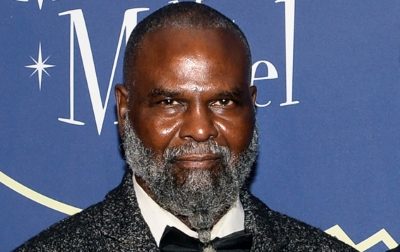 Fulton Leroy Washington Was a Prison Painter. Now He’s an Art-World Star. By Karlos K. Hill / The Nation
Fulton Leroy Washington Was a Prison Painter. Now He’s an Art-World Star. By Karlos K. Hill / The Nation
Fulton Leroy Washington, 66, is one of the most intriguing artists in Los Angeles. Many of his paintings, such as Mr. Rene # MAN POWER or Mondaine’s Market, depict people in federal prison. His work brings to life the communities, families, and loved ones that incarcerated individuals leave behind, while also depicting the despair and fears that people grapple with as result of their imprisonment. Those who want to understand the Black experience—and how that experience has been so fundamentally skewed by mass incarceration—can learn from Washington’s story and artwork. Read more
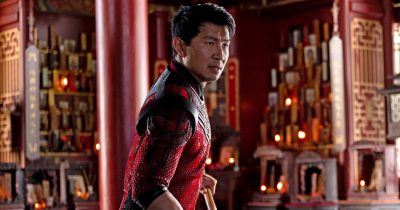 Asian Americans Are Finally Getting the Heroes We Deserve. By Jeff Yang / NYT
Asian Americans Are Finally Getting the Heroes We Deserve. By Jeff Yang / NYT
When I and many of my Asian American peers were growing up, we were so hungry to see ourselves represented that we’d scream and call the family to join us in the living room when an Asian guest star wandered into a scene on TV or a commercial came on featuring an Asian family. We’d scour celebrities’ biographies to surface “undercover Asians,” those with trace evidence of Asian heritage. Phoebe Cates, yes! Joseph Gordon-Levitt, no. Now here we are, on the cusp of the release of Marvel’s “Shang-Chi and the Legend of the Ten Rings,” the first big-budget American blockbuster to center on an honest-to-goodness Asian superhero. Read more
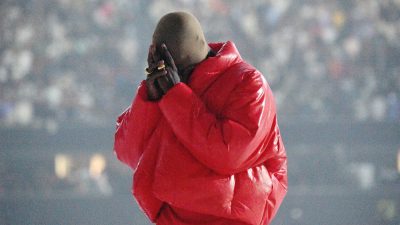 Donda: Kanye, the hype, controversy, music, & the Drake feud, explained. By Aja Romano / Vox
Donda: Kanye, the hype, controversy, music, & the Drake feud, explained. By Aja Romano / Vox
So what’s the deal with Donda? Did Kanye West’s label really release it without his permission? Did Kanye really light himself on fire over it? What about the TikTok panic that he inducted the huge audiences at his listening parties into some dark occult ritual? These aren’t the typical questions you associate with an album release, but Kanye West isn’t a typical artist, and his new 27-track album, Donda (named after Kanye’s late mother Donda West), isn’t a typical album. Read more
Sports
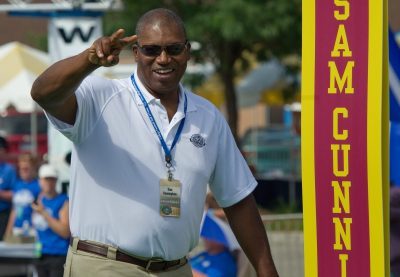 Sam Cunningham, who helped integrate college football, dies at 71. Paul Myerberg / USA Today
Sam Cunningham, who helped integrate college football, dies at 71. Paul Myerberg / USA Today
Sam Cunningham, the former Southern California and NFL running back who played an outsize role in the integration of college football in the South, died Tuesday at 71, according to Southern Cal. As a freshman in 1970, Cunningham was one of three Black starters in the Trojans’ backfield, joining quarterback Jimmy Jones and fellow running back Clarence Davis. In his debut, Cunningham ran for 135 yards and two touchdowns in a 42-21 win against Alabama, which had yet to integrate. His performance, and the dominant play of a USC team featuring Black players in crucial roles, led Alabama coach Bear Bryant to speed up the process of integrating the roster. Read more
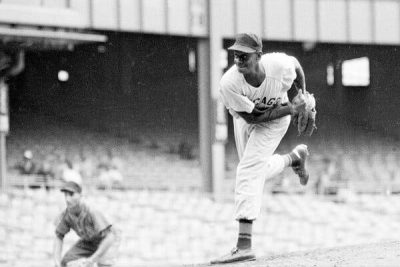 A Flood of New Hall of Famers, Followed by a Grinding Halt. By Andrea Williams / NYT
A Flood of New Hall of Famers, Followed by a Grinding Halt. By Andrea Williams / NYT
It was 15 years ago that the Special Committee on African-American Baseball was able to right a few of baseball’s wrongs by electing 17 Hall of Famers from the Negro leagues and the preceding era of Black baseball. Now, as the Hall of Fame readies for Wednesday’s induction ceremony, in which Derek Jeter, Larry Walker, Ted Simmons and Marvin Miller will be enshrined, and as Major League Baseball continues its process of acknowledging that the Negro leagues were major leagues, it is notable that no players from those leagues have been elected since. Read more
Related: Why there isn’t a single Asian player in the Baseball Hall of Fame. By Kimmy Yam / NBC News
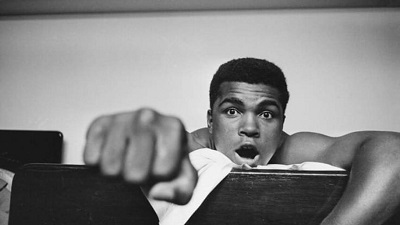 Ken Burns Names Muhammad Ali’s Secret Weapon: An ‘Uncomfortable’ 4-Letter Word. By Ed Mazza / HuffPost
Ken Burns Names Muhammad Ali’s Secret Weapon: An ‘Uncomfortable’ 4-Letter Word. By Ed Mazza / HuffPost
The filmmaker’s next project is about how Ali “intersected with all of the most important issues of the second half of the 20th century.” Boxing legend and activist Muhammad Ali relied on a four-letter word as his “secret weapon” ― one that documentarian Ken Burns said is “so uncomfortable, we don’t know how to talk about it.” That word: Love. “Muhammad Ali” premieres on PBS on Sept. 19. Read more
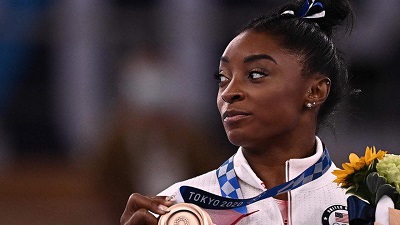 Simone Biles Decimates Critics Who Called Her A ‘Quitter.’ By Carly Ledbetter / HuffPost
Simone Biles Decimates Critics Who Called Her A ‘Quitter.’ By Carly Ledbetter / HuffPost
Simone Biles has the perfect retort ready for anyone who calls her a “quitter”: She can’t hear you over her seven Olympic medals. The Olympic great took to Instagram over the weekend to reflect on the month that’s passed since the Tokyo Olympics. She also snuck in a few words for her critics. “I’ve pushed through so much the past couple years, the word quitter is not in my vocabulary,” the gymnast continued. “For some of you that may be how you define me but keep talking because I can’t hear you over my 7 olympic medals which tied me for the most decorated gymnast EVER as well as most decorated american gymnast.” Read more
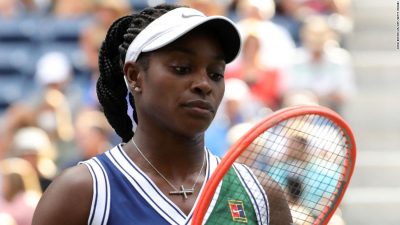 Sloane Stephens says she received more than 2,000 messages of ‘abuse and anger’ after US Open defeat. By Wayne Sterling / CNN
Sloane Stephens says she received more than 2,000 messages of ‘abuse and anger’ after US Open defeat. By Wayne Sterling / CNN
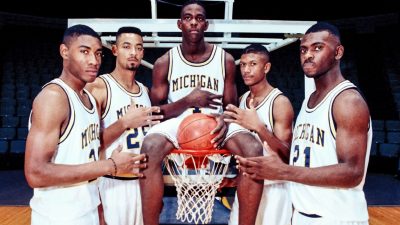 Hall of Fame inductee Chris Webber is finally ready to talk about the Fab Five, the timeout, and his Michigan ban. By Myron Medcalf / ESPN
Hall of Fame inductee Chris Webber is finally ready to talk about the Fab Five, the timeout, and his Michigan ban. By Myron Medcalf / ESPN
Webber arrived at Michigan in 1991 as the reigning Gatorade National High School Player of the Year, joining Jalen Rose, Jimmy King, Ray Jackson and Juwan Howard to create the Fab Five. They were college basketball’s rock stars and took the Wolverines to the national championship game in 1992 and 1993. In the 1993 final against North Carolina, Webber infamously called a timeout that Michigan didn’t have, allowing the Tar Heels to win. He decided to turn pro after that devastating loss, and was the No. 1 pick in the 1993 NBA draft. He was also named NBA Rookie of the Year that season. Read more
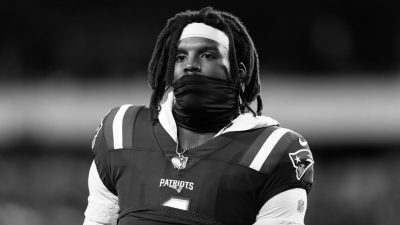 NFL Coaches Have Good Reason to Cut Vaccine Refusers. By Jemele Hill / The Atlantic
NFL Coaches Have Good Reason to Cut Vaccine Refusers. By Jemele Hill / The Atlantic
A popular saying in football is that a player’s best ability is his availability. The idea explains why injured players in professional football are often cut, released, or relegated to lesser roles. It’s why an NFL player’s history of missing games can keep him from getting a big contract. It’s why players who face criminal allegations are handled according to whether they’ll miss time on the field. And it’s also the reason why, amid the NFL’s emphatic push to make sure that players get vaccinated against COVID-19, those who refuse a shot may find themselves expendable—and rightly so. No one should have been surprised last week when the New England Patriots released Cam Newton, a former league MVP who has declined to say whether he has been vaccinated and insisted that the matter is a personal decision. Read more
Site Information
Visit our home page for more articles, book/podcast and video favorites. And at the top of this page register your email to receive notification of new editions of Race Inquiry Digest. Click here for earlier Digests.
About Race Inquiry and Race Inquiry Digest. The Digest is published on Mondays and Thursdays.
Use the buttons below to share the Digest in an email, or post to your Facebook, Linkedin or Twitter accounts.
 Critical race theory turning school boards into GOP proving grounds. By Daniel Payne / Politico
Critical race theory turning school boards into GOP proving grounds. By Daniel Payne / Politico